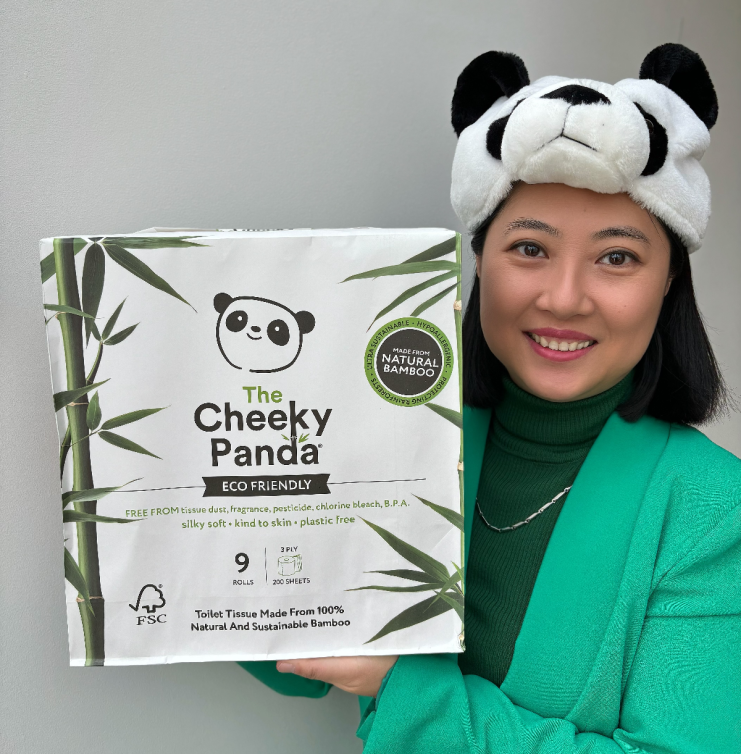How I built a successful brand – with the help of a panda and some bamboo

One of Britain’s best-loved start-ups is now a fixture of many bathrooms. But it all started in a bamboo forest in China, The Cheeky Panda founder Julie Chen tells Ambition A.M.
Is the secret really just the cute panda?
Whatever the reason for their success, Julie Chen and her husband have certainly found it in growing their sustainable tissue roll business – The Cheeky Panda – from an idea in 2016 to a brand now worth £85m.
But as I sit with Chen (who I must reveal is happily wearing her renowned big fuzzy panda hat) I come to find that it takes much more than a panda and some bamboo to create the business’ glue.
Instead, the 42-year-old founder believes ‘softness’ might just be her biggest strength – both in the product she makes and in the way she does business.
Facing the unknown
Four years into her venture, Chen found herself at the centre of an unlikely national drama: the pandemic-induced toilet paper shortage.
On the one hand, a great opportunity. On the other, a huge challenge. How were they going to keep up with the demand that surged so quickly?
Through a little dedication and a lot of hard work, it seems.
We managed to ship 200 containers in a month to supply the market demand
Julie Chen
“We managed to ship 200 containers in a month to supply the market demand,” she tells me.
“Our products then were getting to millions of people’s hands and even [when] the pandemic demand faded in the end, because people got to try our products they stayed on with our products,” she adds.
But to attribute the triumph to herself would be a disservice, she says, given that she couldn’t have done it without her team.
“At the end of day, it’s not just me building a business – it’s a team of people who are really passionate about our cause,” she says.
Chen tells me there are “a lot” of factors to consider when building a successful business, especially as a female founder, but maintaining the company’s DNA – both within the team and the brand – is what sets you apart from the rest.
“It’s about really believing in my team, their capability, and really developing them as well and giving them the opportunity to learn,” she adds.
“But also, when they make a mistake, it’s about how can I help – how can we help?”
You could say leading a strong team of 35 through the great toilet shortage is what helps The Cheeky Panda remain one of the UK’s most well-regarded start-ups, but building the right foundation is what helped Chen get it there in the first place.
Forming the foundation
A successful business plan doesn’t always mould together perfectly overnight. Sometimes, it even takes a little unlikely inspiration.
For Chen, it was having the idea of a brand on hand to later tie in with the perfect type of product.

The idea of a ‘sustainable panda’ came during her business studies in Japan. If Disney could create a brand based on a range of fun story-telling characters, she thought, surely she could try with a friendly panda.
But it wasn’t until she drove through the bamboo forests on her way to visit a local toilet paper facility in western China a few years later that the combination became a “no brainer”.
“We thought, wow, it’s just a no brainer. Why are we cutting down trees when we’ve got this resource which is highly renewable, it’s not panda food, we’re not using it… so we just decided when we come back [to the UK] we have to launch this business,” she says.
This eco-friendly mindset also helps The Cheeky Panda maintain its B Corp status – especially given that their product’s 100 per cent bamboo is Forest Stewardship Council (FSC) certified and not the same type that pandas “chomp down on”.
Chen, who admits to her fair share of entrepreneurial “failures,” says learning as you go – while utilising empathy and care – is the key to any business success.
“We went through a lot of failures, and I learned them very fast,” she adds.
“You have to make mistakes and then you realise, OK, maybe I need to do it a different way.”
Now, Chen tells me the focus is learning how to balance even more growth with staying true to the brand’s identity.